Table of Contents
Noisy Garage Door?
A garage is a beneficial feature for any home, but if you’re asking yourself “Why is my garage door so noisy?” chances are it requires maintenance or repairs. You rely on your garage door for convenience and safety. Screeching and grinding sounds can disrupt a peaceful morning and often suggest a more significant problem. Spending a few hours every year to maintain your garage door will keep it functioning smoothly and quietly.
With a few fixes and regular maintenance, you can prevent garage door noise. Garage doors are heavy and pressurized, which can make do-it-yourself repairs dangerous. While you can do a few things at home to help keep your garage door running smoothly, some repairs will require professional help.
Understanding what causes a loud garage door will help you identify the proper steps to fix it. This guide will explain common causes of a noisy garage door, how to fix them and how to maintain your garage door to prevent loud noises in the future.
Below, we explore the signs for six of the most common causes of these garage door noises.
What Causes a Noisy Garage Door?
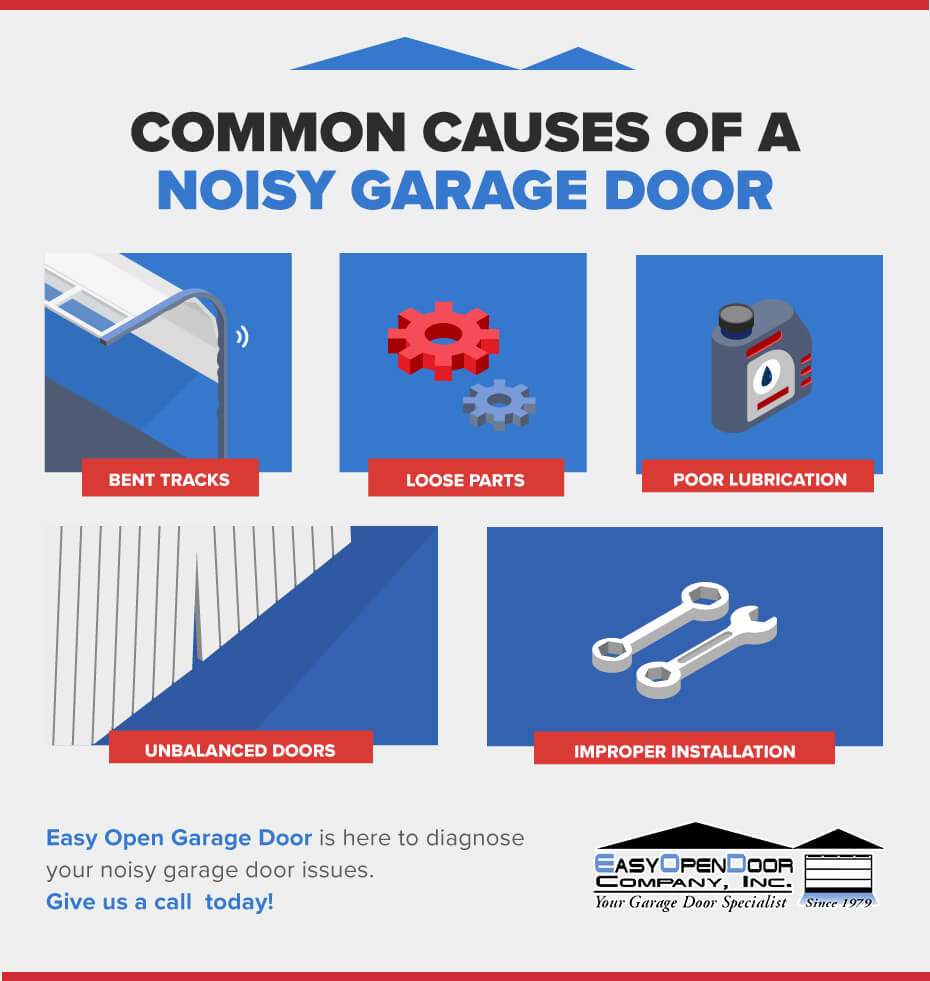
Six of the most common causes of a loud garage door are bent tracks, loose parts, poor lubrication, unbalanced doors, improper installation, and acoustic issues. Learn more about each of these common issues below:
1. Bent Tracks
If your garage door seems to struggle when opening and closing, the metal track might have bent. Bent tracks often cause a loud rubbing noise when the garage door is in motion. Check for loose screws or rollers that can come undone from a damaged track. A garage door repair specialist can adjust your tracks so they align correctly.
2. Loose Parts
Your garage door relies on a series of parts that work together to open and close it. The rollers, hinges, nuts, bolts and chain must be in good condition for your garage door to operate smoothly. Eventually, some parts will wear out and make it challenging for your door to function as it should. When one piece of equipment breaks down, it can create quite a racket. Knowing how to identify wear and tear on each piece of equipment will help you narrow down which ones require maintenance. Check to see if these parts have come loose:
- Rollers and Hinges: When rollers and hinges start to wobble, they might need tightening or replacing. Over time, these loose parts become worn out or damaged. You may hear high-pitched squeaking or grinding noises if your rollers or hinges start to deteriorate.
- Chain: When your garage door opener chain becomes loose, it creates a loud slapping sound and jerky door movements. A loose chain can also cause the rollers to smack against the track.
- Nuts and Bolts: Loose bolts can vibrate, causing your garage door to rattle when opening and closing. While nuts and bolts are small, they can make a loud noise if they become detached.
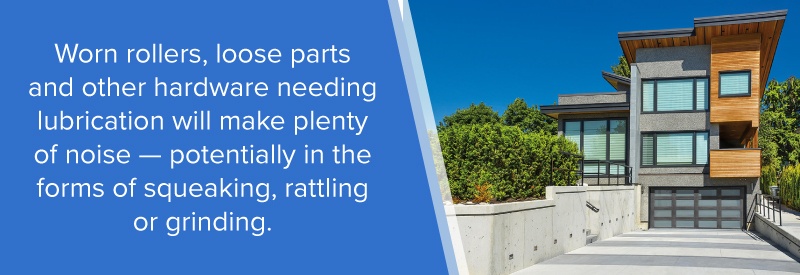
3. Poor Lubrication
Proper lubrication is essential for your door to run quietly and efficiently. Without lubrication, worn rollers and hardware will rub together and make a lot of noise. You may hear squeaking, rattling and grinding sounds. Luckily, this is one of the most straightforward issues to address.
4. Unbalanced Doors
Balanced springs are essential for placing tension on your garage door so that it raises and lowers properly. When a garage door becomes unbalanced, it’s typically the result of springs exerting too much or too little tension to counterbalance the door’s weight. Both these scenarios can place added strain on the opener. An unbalanced garage door is hazardous and could result in a snapped spring or cable.
The following are common signs of an unbalanced door:
- The door appears uneven when you open or close it.
- It takes a long time for the door to open or close.
- The garage door is stuck shut.
- The door makes odd noises, such as banging, rattling, scraping or squeaking.
5. Improper Installation
A well-installed garage door should open and close easily with minimal sound. If you’re experiencing challenges with your garage door, there may be a problem with the installation. Check for these signs of faulty garage door installation:
- The garage door gets stuck halfway.
- It struggles to open and close properly.
- You frequently hear loud grinding, squealing or rattling sounds.
Find a reliable repair service you can trust to resolve these mistakes. Easy Open Door operates with honesty and integrity to give you confidence in our work.
6. Acoustics
All garage doors make some degree of noise when they operate. If your garage door appears to be working as it should, but it still seems too loud, your garage itself might need soundproofing. Insulating your garage can improve the acoustics in the room and absorb the sound before it enters your home.
Noisy Garage Door Diagnostic Checklist and What to Fix
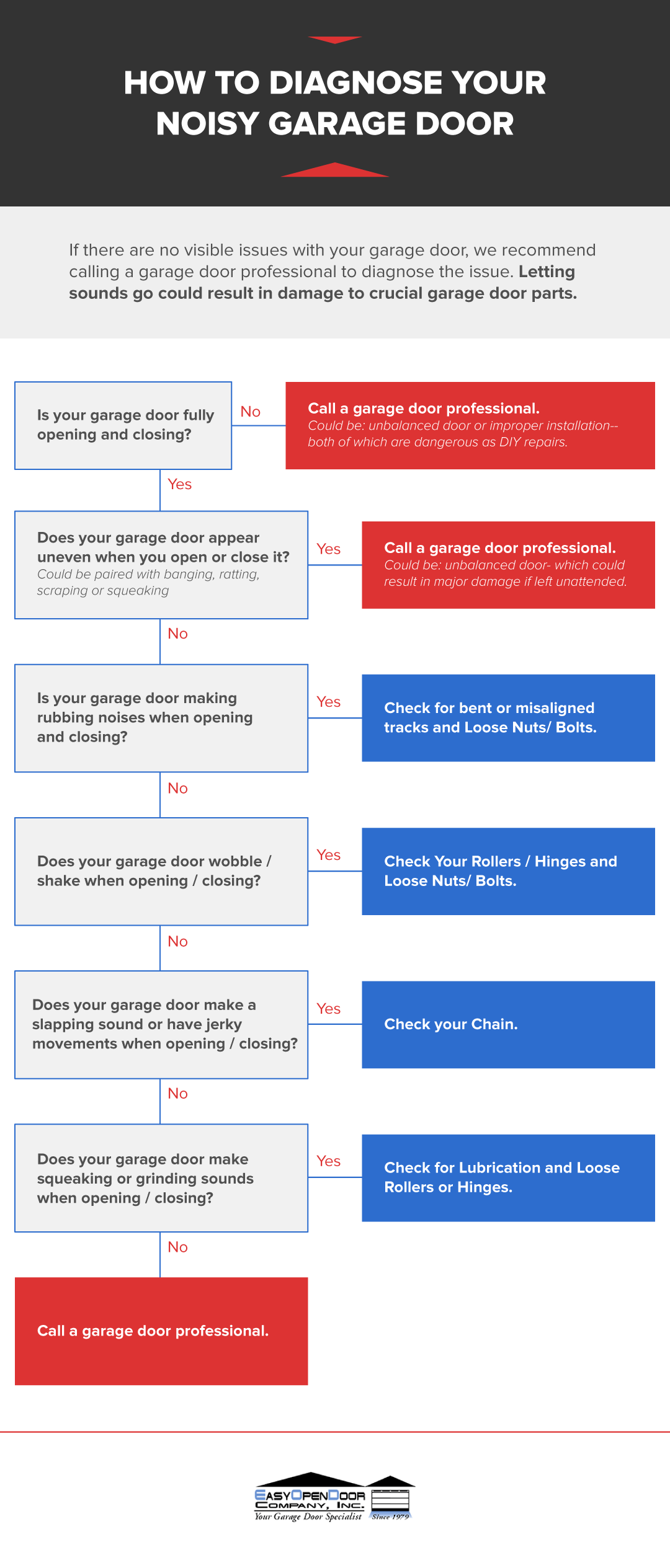
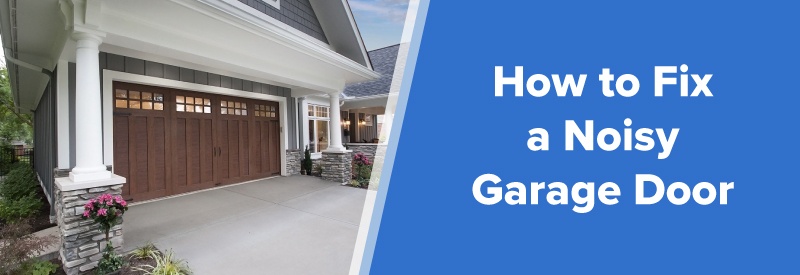
How to Fix a Noisy Garage Door
Follow these steps to make your garage door quieter. To fix a noisy garage door you can start by tightening nuts and bolts, repairing the rollers, servicing the springs, and restoring the hinges. Following these steps can soften the noise and ensure it works as expected. Here is an in depth look at each step.
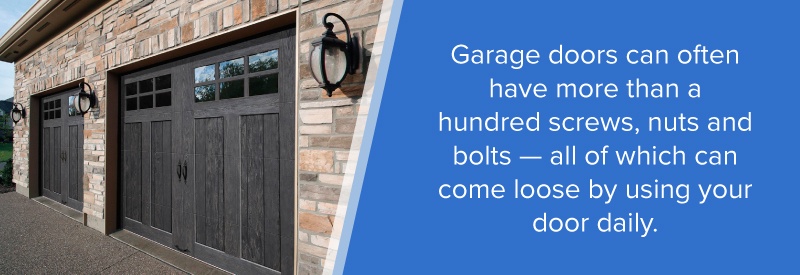
1. Tighten Nuts and Bolts
Garage doors have more than 100 screws, nuts and bolts. With daily use, these attachments can loosen over time. When the door is in use, it will vibrate and rattle loose pieces, which can be noisy. To reduce the clatter, it takes only a few minutes to check each one and tighten them as necessary. All you need is a wrench or socket set.
Once you have fastened everything again, your garage door should stop rattling. If you continue to hear loud noises, try the remaining strategies to soften the sound.
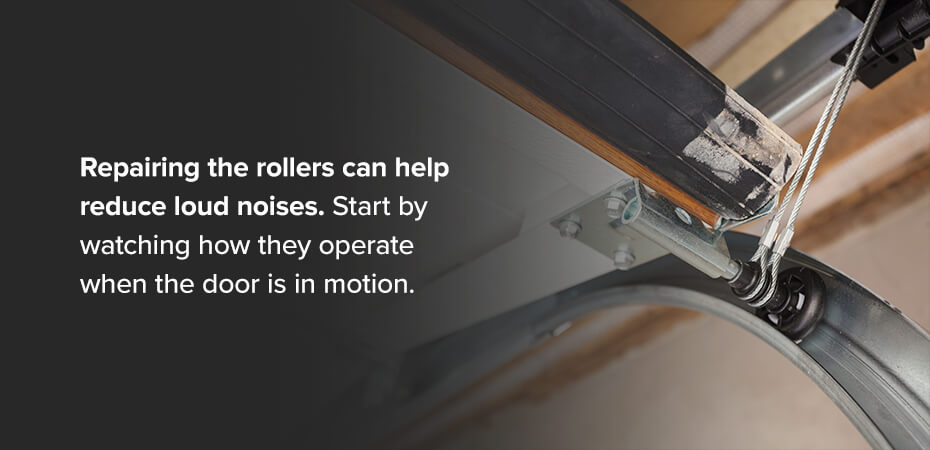
2. Repair the Rollers
Another common cause of a loud garage door is worn-out rollers. Each time you open or close your garage, the rollers move to guide the door along the track. This process slowly wears away at the rollers’ surface. When there’s damage to the rollers, they can become bound up and rub against the track. If the rollers get stuck, they create friction inside the track, causing a distinct grinding sound.
Repairing the rollers can help reduce loud noises. Start by watching how they operate when the door is in motion. If you notice the rollers appear worn, you should have them replaced by a professional. Some rollers are under a lot of tension and can be very dangerous to handle without proper training.
If your metal garage door rollers appear to be working correctly but still create a deafening squeal, they probably need lubrication. Some lubricants can degrade plastic and nylon rollers and are unnecessary for versions with sealed ball bearings. An expert technician can advise which lubricants to use and repair your rollers during regular maintenance visits.
If you’ve tried to lubricate the rollers yourself and they still make noise, you should consider having them replaced. While nylon roller replacements tend to cost more, they are often quieter than metal varieties. The material glides on its own, eliminating the need for lubricant, so they are easier to maintain. Take measurements before ordering to make sure you choose the correct size. Standard rollers have a four-inch stem and a two-inch roller. Or, you can leave it to a professional to measure and order the parts for your garage door repair.
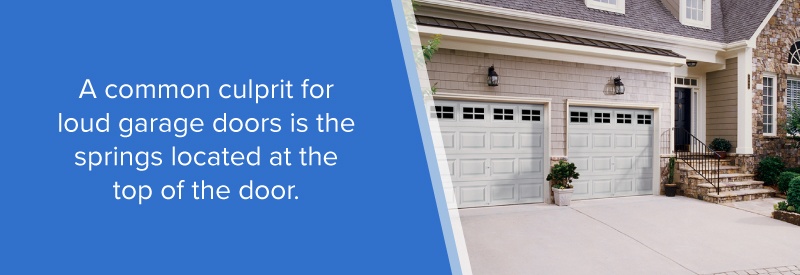
3. Service the Springs
To make lifting and lowering easier, garage doors use two types of springs — extension and torsion. You’ll find extension springs on both sides and above the upper track. Torsion springs attach to the header, which is right above the closed door.
A common culprit for loud garage doors is the springs located at the top of the door. It’s best to lubricate the springs several times a year. Be cautious of the extreme tension torsion springs are under — don’t place any part of your body in or near the springs. Hire a professional to repair, remove or adjust the springs and any connected components of the counterbalance system like:
- Wood blocks
- Steel brackets
- Bolts
- Cables
- Fasteners
To lubricate garage door springs, you’ll need to spray them lightly with a silicone lubricant or white lithium grease. Apply the lubricant sparingly to prevent it from dripping down your door while it’s in motion.
If the noise persists, your springs may be worn out or broken and in need of a replacement. Call a garage door technician to repair your springs so your garage door can function smoothly again.
4. Restore the Hinges
Most families use their garage door multiple times a day, adding up to thousands of uses every year. Over time, even the most durable parts will eventually wear out. Your garage door hinges are no exception. Though hinges tend to last longer than other parts, they will eventually break. As your garage door hinges deteriorate, they can make a disruptive sound.
Check to see if the hinges are worn out, broken or covered with shavings. Metal and gray dust particles around the pin of the hinge are early indications of wear. If you notice an oblong hole where the bracket and tubular hinge pin connect, the hinges may be broken. A trained technician can inspect your garage door and repair or replace your hinges.
Once you’ve diagnosed the problem, leave it to the professionals to complete the repairs. Tampering with the brackets could make your door fall, potentially causing severe injuries. Only a professional garage door technician should repair hinges.
If your hinges appear to be in good shape, you can use a synthetic lubricant to grease them yourself. However, you should still take safety precautions. Disconnect the opener so that no one accidentally uses the door while you’re working on it. You should also wear gloves to protect your hands from the lubricant.
Living with a noisy garage door can be challenging, especially if it’s not functioning correctly. Fortunately, those are the steps you can take steps to soften the noise and repair your door so it works as expected.
Standard Garage Door Problems and Their Solutions
If you’re having one of these three common garage door issues, there is typically a simple solution.
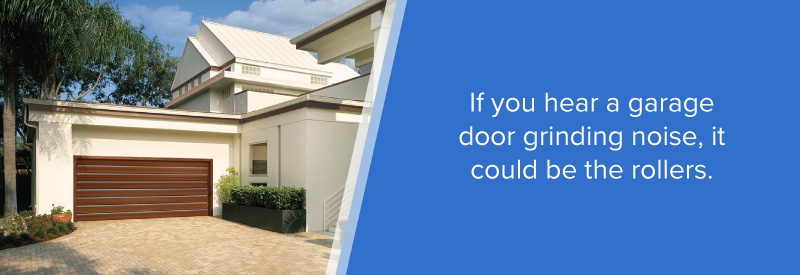
1. Squeaky Garage Door or Garage Door Grinding Sound When Opening or Closing
If you hear a garage door grinding noise, it could be the rollers. The door track rollers move each time you open or close the door, leading to a lot of movement and causing wear. This wear could damage the roller surface, causing them not to roll correctly. They can also become bound up, leaving them sliding in the track causing friction and a lot of noise.
How to Fix a Squeaky Garage Door: Lubricate or Replace
Replace the rollers — preferably with solid nylon or nylon-coated varieties — which leads to quieter door operation. Plus, nylon rollers don’t require periodic lubrication. Other rollers, however, do require lubrication at least twice a year. Lubrication prevents your garage door from causing vibrations when you operate it.
2. Garage Door Making Popping Sound When Opening
A popping noise when opening your garage may indicate locked torsion springs. Many garage doors come with big torsion springs and over time they can lock and prevent smooth operation causing the popping sound you hear.
How to Fix: Lubricate with Motor Oil & Wipe Clean
The spring requires lubrication with motor oil and should be wiped clean using a dry cloth. Again, you shouldn’t attempt to lubricate torsion springs yourself — instead, have a trained technician handle the job.
3. Garage Door Crashes to the Ground When Closing
The torsion springs could also cause your garage door to come crashing down to the ground when you close it. If you notice this happening, the torsion springs may be loose.
How to Fix: Call a Specialist to Replace It
Since torsion springs function under extreme tension, repairs or replacements, contact your local garage door technician to fix any loose or broken torsion springs right away.
Other Methods to Make Garage Door Quieter
If your garage door appears to be functioning properly, you can try these additional methods to prevent garage door noise.
1. Add a Rubber Buffer
Adding rubber to specific garage door components can help absorb vibrations and cushion loud noises. You can place a rubber pad between the garage door opener and the ceiling mount for a snug fit that eliminates rattling. If the nuts and bolts clatter when they come loose, consider replacing metal washers with rubber varieties.
If you look at the bottom of your garage door, you should find rubber weatherstripping along the edge. When your garage door closes, this piece seals the bottom to insulate your garage and keep insects and harsh weather out. It can also cushion the bottom of your garage door to prevent it from hitting the cement and making a loud sound.
2. Install Nylon Rollers
Some rollers can cause more noise than others. To make your garage door quieter, as mentioned above, you’ll want to purchase nylon rollers instead of metal ones. They absorb sounds better and don’t require as frequent lubrication as the metal rollers do.
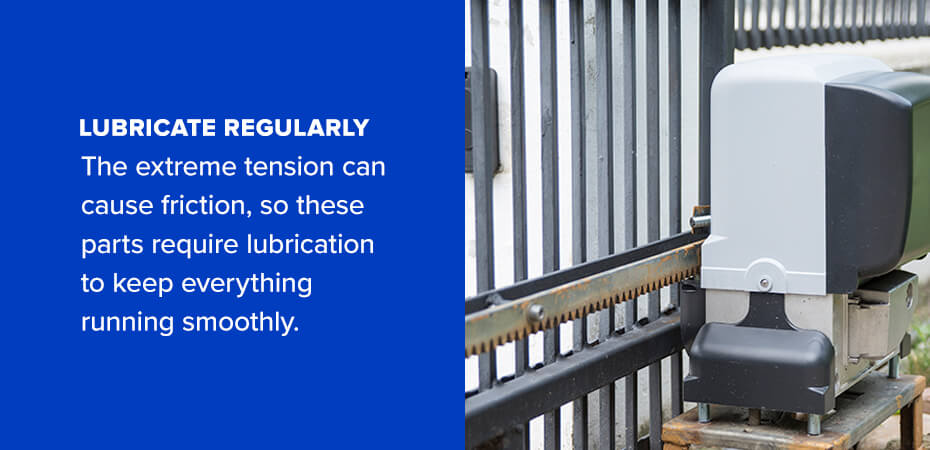
3. Lubricate Regularly
A garage door can weigh several hundred pounds and place a lot of pressure on the hardware that raises it up and down. The extreme tension can cause friction, so these parts require lubrication to keep everything running smoothly. If the lubrication dries up, these parts can grind against and stick to one another, causing excess vibrations. Keeping everything greased will prevent rattling and other loud sounds.
After resolving the noise, be proactive and continue lubricating regularly to prevent the sound from coming back. It can also extend your garage door’s life by preventing friction that can damage various components.
A good rule of thumb is to lubricate the bearings, rollers and hinges at least once a year. You may also want to grease the garage door’s frame once a year to help it slide easier.
Be sure to choose a lubricant that is safe for metal, like 10W-30 motor oil. You can also look for silicone sprays or white lithium grease. An aerosol spray works well to maintain tiny moving parts. Apply the lubricant and wipe any excess off with a cloth.
4. Perform Essential Garage Door Maintenance
Proper garage door maintenance is essential to keep your door operating correctly and safely. Performing regular tune-ups and repairs once or twice a year will prevent surprise issues from disrupting your busy schedule. It takes only a few hours to inspect your garage door yourself, or you can hire a professional. Perform the following tasks at least once a year to keep your garage door functioning smoothly.
- Clean the tracks: The tracks must be clear of dirt and debris so your garage door can slide up and down quietly. Clean out leaves and dust that can accumulate and block the rollers.
- Inspect every part: Check your entire garage door for broken parts, from the fasteners and hinges to the cables and pulleys. While your garage door will sometimes function with a few broken pieces, it can cause other parts to break, leading to costlier repairs.
- Perform safety tests: Modern garage doors come standard with an auto-reverse feature. To test if it’s still working, place a small object under your garage door and attempt to close it. When the door reaches the object, it should automatically stop and reverse. Otherwise, your sensors may need repairs.
- Wash and paint: Dust and grime can build up on your garage door and the small parts that make it move. Washing the door and touching up the paint will make your garage look better and clean the hardware so it functions properly.
- Check the balance: A balanced garage door is safer and more efficient. To test your garage door’s balance, release the automatic opener and try lifting the door halfway. An unbalanced garage door will fall to the ground. A garage door repair professional can rebalance your door.
Our team at Easy Open Door can perform detailed maintenance and make necessary repairs, freeing you to focus on more important tasks.
Schedule Maintenance and Repairs With Easy Open Door
If you’d rather leave garage door maintenance to the professionals, Easy Open Door can help your garage door last for years to come.
Each of our reputable technicians has at least 15 years of experience working with garage doors. We’ll figure out what’s causing your noisy door and resolve the problem quickly. We also offer annual maintenance to keep your garage door lubricated and functioning.
Our team is reliable and efficient, restoring your garage door as soon as possible. We’ve been helping homeowners in San Diego and the surrounding area for nearly 40 years. You can trust our team at Easy Open Door to get the job done right. Request a free estimate or schedule service today for garage door maintenance and repairs. If you’d like to explore new garage door options, consult with our professionals on the best garage door material for your home.

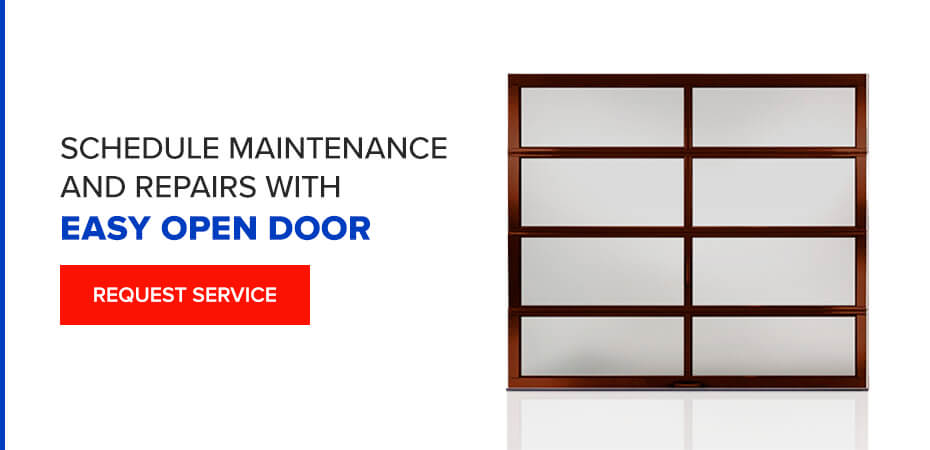

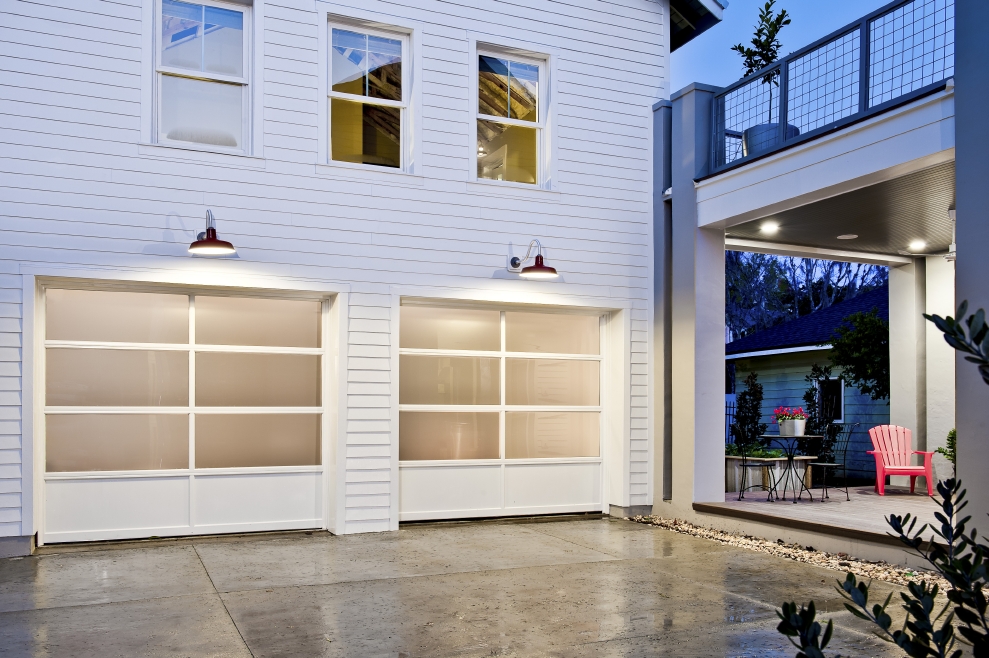
It makes sense that your door might be unbalanced if you notice a loud sound coming from your garage door. My garage door has been making a very strange sound lately. I think it would be a good idea to look for a repair company.
The door makes a banging noise when opening so I go inside and click the opener. The noise is from the top center of the door. I closed the door and re-opened it. The noise now comes from the upper right of the door. The door is only 18 years old and only used 8 or 10 times a day. Time to call the installer ?
Great tips! I hate when loud garage sounds wake me if my family leaves really early.
I wasn’t aware that the tracks for a garage door could bend! It makes sense that this would produce rubbing noises, as you mentioned. My garage doors have been doing this for the past couple of months, but I didn’t know that it was bad. I’ll start looking for a company that could help me repair my garage door so I can continue parking in there.